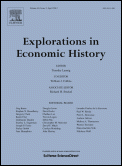
EXPLORATIONS IN ECONOMIC HISTORY
Scope & Guideline
Advancing Knowledge at the Intersection of Time and Economy
Introduction
Aims and Scopes
- Historical Economic Analysis:
The journal publishes research that analyzes economic events and trends through a historical lens, providing insights into how past economic practices influence contemporary issues. - Interdisciplinary Approaches:
Contributors often employ methodologies from various fields, including economics, history, sociology, and political science, to create comprehensive narratives about economic phenomena. - Focus on Inequality and Social Structures:
Many papers explore themes of inequality—be it economic, racial, or gender-based—highlighting how these structures have evolved and their implications throughout history. - Quantitative and Qualitative Research:
The journal encourages both quantitative analyses, utilizing statistical methods and data mining, and qualitative approaches, such as case studies and historical narratives, to enrich the understanding of economic history. - Global and Comparative Perspectives:
Research often spans multiple geographical contexts, comparing economic histories across different regions and time periods to draw broader conclusions about economic development.
Trending and Emerging
- Economic Inequality and Social Justice:
There is a marked increase in studies examining economic inequality, including racial, gender, and regional disparities, reflecting a growing interest in social justice issues within historical contexts. - Impact of Globalization on Historical Economies:
Recent papers often address the effects of globalization throughout history, analyzing how interconnectedness has shaped economic outcomes across different regions and time periods. - Health Economics and Historical Pandemics:
The COVID-19 pandemic has spurred a rise in research linking health outcomes with economic history, examining how historical pandemics influenced economic structures and societal resilience. - Migration and Economic Change:
Studies focusing on the economic impacts of migration—both voluntary and forced—are increasingly prevalent, exploring how demographic shifts have historically influenced economic landscapes. - Environmental Economics in Historical Context:
Emerging research is beginning to explore the interplay between historical economic practices and environmental outcomes, reflecting a growing recognition of sustainability issues in economic history.
Declining or Waning
- Traditional Industrial Economy Studies:
While historical analyses of traditional industries were once prominent, there is a noticeable decline in papers focusing solely on the industrial revolution and its direct economic impacts, as newer themes take precedence. - Exclusively Eurocentric Perspectives:
Research that focuses solely on European economic history without comparative or global contexts is becoming less frequent, as the journal increasingly embraces a more globalized view. - Narrow Focus on Specific Economic Theories:
Earlier publications often centered around specific economic theories (e.g., classical or neoclassical economics). However, the journal has shifted towards a broader integration of various theoretical frameworks, leading to a decrease in strictly theoretical papers. - Limited Case Studies of Singular Events:
Papers that analyze isolated historical events without broader implications or connections to wider economic trends are less common, indicating a shift towards more integrative and comprehensive studies.
Similar Journals
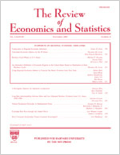
REVIEW OF ECONOMICS AND STATISTICS
Unveiling trends that shape the economic landscape.REVIEW OF ECONOMICS AND STATISTICS, published by MIT PRESS, stands as a pivotal journal in the fields of economics and econometrics, with origins dating back to 1978. As a high-impact publication with impressive 2023 rankings placing it in the Q1 category for both Economics and Econometrics, and Social Sciences (miscellaneous), it serves as a crucial platform for scholarly discourse. With an E-ISSN of 1530-9142, the journal provides vital insights and analyses that drive contemporary understanding of economic phenomena. Recognized for its rigorous peer-review process and influential research, the REVIEW OF ECONOMICS AND STATISTICS is essential for researchers, professionals, and students aiming to advance their knowledge and contribute to the field. Though it does not currently offer open access, its substantial impact factor and cutting-edge studies ensure that its articles remain indispensable resources for anyone dedicated to the advancement of economic research.

Oeconomia-History Methodology Philosophy
Fostering Innovative Insights Across DisciplinesOeconomia-History Methodology Philosophy, published by ASSOC OECONOMIA, is a distinguished academic journal focused on the interdisciplinary study of economics, history, methodology, and philosophy. With its ISSN 2113-5207 and E-ISSN 2269-8450, this Open Access journal has been committed to disseminating high-quality research since 2011, enabling widespread accessibility to its content. Based in Paris, France, the journal holds impressive rankings, including a Q1 quartile in History and a Q3 quartile in both Economics, Econometrics and Finance, as well as Sociology and Political Science for 2023. This diversity highlights its multifaceted approach to understanding complex societal issues. With significant visibility in leading databases, including Scopus, it appeals to researchers, professionals, and students alike, fostering robust discussions and innovative insights in their respective fields. The journal currently spans from 2018 to 2024, offering a platform for critical analyses and theoretical advancements that challenge established norms and encourage new perspectives.

Ekonomista
Exploring the dynamics of economics through open access.Ekonomista is a distinguished open-access journal dedicated to the field of economics, published by the Polskie Towarzystwo Ekonomiczne. Since its transition to open access in 2022, the journal has enhanced its mission to disseminate high-quality research that serves the academic community and informs policymakers. With an ISSN of 0013-3205 and an E-ISSN of 2299-6184, Ekonomista aims to foster rigorous discussions and innovative perspectives on current economic issues. Although it has experienced lapses in coverage through Scopus, its commitment to advancing knowledge in Economics, particularly in the realms of econometrics and finance, remains steadfast. The journal is indexed within the lower echelons of Scopus rankings, providing an opportunity for new voices in the discipline to emerge and contribute to the ongoing discourse. Positioned at ul. Nowy Swiat 49 in Warszawa, Poland, Ekonomista not only connects researchers and professionals but also serves as an educational resource for students aiming to deepen their understanding of economic theories and practices.
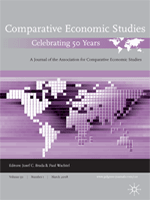
Comparative Economic Studies
Exploring Global Economic DynamicsComparative Economic Studies is a prominent academic journal dedicated to the field of economics, published by Palgrave Macmillan Ltd. Now in its converged years from 1996 to 2024, this journal provides a robust platform for innovative research and critical analysis within the economics and econometrics arenas. With an ISSN of 0888-7233 and an E-ISSN of 1478-3320, it has established itself as a vital resource for scholars and practitioners interested in comparative economic analysis, policy evaluation, and theoretical advancements. Recognized for its quality, the journal is classified in the Q3 category in 2023, reflecting its solid standing within the field, with a Scopus rank of 390 out of 716 journals in economics and econometrics. Although it currently does not offer open-access options, the journal is committed to disseminating significant findings that influence policy and scholarship globally. Its well-curated articles play an essential role in shaping contemporary economic discourse, making it an indispensable resource for researchers, professionals, and students alike.
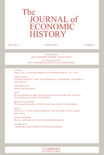
JOURNAL OF ECONOMIC HISTORY
Advancing Knowledge Through Economic NarrativesJOURNAL OF ECONOMIC HISTORY, published by Cambridge University Press, is a renowned academic platform dedicated to the exploration and analysis of economic history from its inception in 1941 through the forthcoming decades. With its ISSN 0022-0507 and e-ISSN 1471-6372, this journal occupies a prestigious place in the field, as evidenced by its impressive Q1 rankings in both Economics and Econometrics and History categories for 2023. It is positioned among the top tier of journals, ranking #42 out of 1760 in the Arts and Humanities (History) and #75 out of 242 in Economics, Econometrics, and Finance (Miscellaneous) according to Scopus metrics. The journal's rigorous peer-reviewed articles aim to bridge theoretical frameworks with empirical research, fostering an understanding of historical economic dynamics and their relevance in contemporary society. Although the journal does not offer open access, it continues to serve as an essential resource for researchers, professionals, and students aiming to deepen their knowledge and contribute to critical discussions within the fields of economics and history. The journal publishes diverse articles that engage critically with both primary and secondary sources, ensuring that its contributions remain impactful and influential within the academic community.
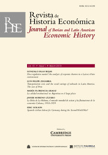
Revista de Historia Economica
Charting the Evolution of Economic Ideas Through TimeRevista de Historia Economica, published by Cambridge University Press, is a distinguished peer-reviewed journal that serves as a vital platform for interdisciplinary scholarship in the fields of Economics and History. With an impressive impact factor and ranked within the top quartiles in its respective categories—Q2 in Economics and Econometrics and Q1 in History—this journal stands as a significant resource for researchers and professionals seeking to explore the intricate relationships between economic phenomena and historical contexts. Covering a timeline of research from 1983 to 2024, it addresses both contemporary and historical economic issues, making it an essential read for students and scholars alike. The journal, although not Open Access, maintains rigorous standards of academic excellence and inclusivity, aiming to enhance the understanding of economic history through comprehensive analyses and innovative perspectives. Its esteemed editorial board and qualitative publications ensure that Revista de Historia Economica is at the forefront of economic historiography, attracting a wide readership base in the United Kingdom and beyond.

Cliometrica
Transforming Historical Data into Economic InsightsCliometrica, published by Springer Heidelberg, is a prestigious journal that has made significant contributions to the fields of Economics and Econometrics as well as History. With an impressive 2023 Scopus ranking placing it in the Q2 category for Economics and Econometrics and the Q1 category for History, this journal stands out as an essential resource for researchers, professionals, and students alike. Known for its rigorous scholarly approach, Cliometrica merges quantitative and qualitative methodologies to uncover insights into historical economic analysis, reflecting the interdisciplinary nature of contemporary research. With access strictly through subscription, it continues to uphold high academic standards, making it a vital addition to any academic library. Published in Germany, Cliometrica serves as a key platform for advancing the discussion and understanding of historical econometric techniques, ensuring its relevance and importance in both historical and economic research circles.

Asia-Pacific Economic History Review
Exploring Historical Narratives Through Economic LensesAsia-Pacific Economic History Review is a distinguished journal published by WILEY, focusing on the rich and dynamic intersection of economic and historical perspectives within the Asia-Pacific region. With the ISSN 2832-157X, this peer-reviewed journal stands out for its commitment to open access, ensuring that groundbreaking research is readily available to academics and practitioners alike. As a newly established platform from 2023 to 2024, it has rapidly garnered attention, earning a Q1 classification in History and Q3 in Economics and Econometrics for 2023, reflecting its dual significance in both fields. The journal's ranking within the Scopus database showcases its rising impact, particularly within the top percentile for Arts and Humanities in History. Scholars are encouraged to contribute to this high-quality, interdisciplinary forum that explores the economic histories of the Asia-Pacific region, providing valuable insights and fostering discourse among researchers, professionals, and students passionate about this vital area of study.
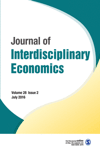
Journal of Interdisciplinary Economics
Empowering Research Across Economic BoundariesThe Journal of Interdisciplinary Economics, published by SAGE Publications India Pvt Ltd, is a distinguished platform for innovative research in the field of economics, promoting interdisciplinary approaches that integrate various economic theories and practices. Founded in 2004, this journal has established itself as a pivotal resource for scholars and professionals, fostering a deeper understanding of economic phenomena through empirical studies, theoretical discussions, and methodological advancements. With an ISSN of 0260-1079 and E-ISSN of 2321-5305, the journal is indexed in Scopus, achieving a commendable Q3 classification in Economics and Econometrics in 2023. As a contributor to a growing body of knowledge, authors will find an audience keen on groundbreaking insights and varied perspectives, making it an excellent venue for disseminating impactful research. Although it operates under a subscription model, the journal ensures that its high-quality content remains accessible to a wider academic community. Researchers, practitioners, and students are encouraged to engage with and contribute to this vital discourse in economic research.

History of Economic Thought and Policy
Bridging the Gap Between Theory and Practice in EconomicsHistory of Economic Thought and Policy is a vital journal published by FRANCO ANGELI, dedicated to exploring the intersections of economic theory, historical context, and public policy. With ISSN 2240-9971 and E-ISSN 2280-188X, this journal serves as an essential platform for scholars interested in the evolution of economic ideas and their implications for contemporary policy-making. Operating from Italy, it has established a comprehensive framework for interdisciplinary research in the fields of Economics and Econometrics, History, and Public Administration, although it currently holds a Q4 ranking in these categories according to 2023 metrics. The journal already encompasses multiple converging years from 2018 to 2024, underscoring its commitment to timely contributions to economic discourse. It aims to provide open access to its content, fostering a collaborative environment for researchers, professionals, and students keen on enhancing their understanding of economic thought throughout history. Despite its current challenges in Scopus rankings, with notable positions in arts, humanities, and social sciences, History of Economic Thought and Policy remains a promising outlet for significant and critical discussions surrounding the historical pathways that shape today’s economic policies.